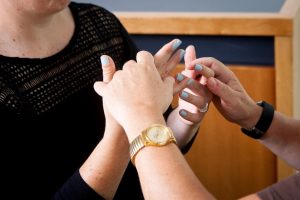
By: Melinda Allen, Intervenor Specialist
In my current studies on disability issues, I often come across the concept of “autonomy in care”. Dignity is almost always found alongside autonomy. When people feel that they are becoming too dependent on someone else, there is potential for their dignity to be threatened. Michael Oliver, writer and disability rights activist, talks about how dependency on “carers” is a created ideology and not actually based on people’s functional abilities.
Needing support does not mean a lack of independence.
Non-disabled people have created a stigma towards people with disabilities when they need support or assistance with something. However, seeking support simply means that people must rely on other people because we are living in a society that makes it impossible to do things alone.
For example, people are dependent on farmers to make the food that they buy to provide nourishment for themselves and their families. This has nothing to do with being able-bodied or having a disability, rather it’s about the fact that people who are not farmers by trade don’t have the skill-set or infrastructure to farm our own food – we rely on being able to buy it from the grocery store. People with disabilities have been working hard to change the mindset that people who are in need of “care” or “assistance” are not to be viewed as dependent on someone else, but are merely using that support as an extension of their independence.
This really resonated with me as an intervenor because this is exactly what intervenor services aim to do. Intervenors are meant to create space for people who are Deafblind to be able to make their own choices. In guiding, the phrase “here’s my arm” can have deeper meaning – “you can reach out for it for support in moving around or you can continue on yourself”.
“All the seats on the streetcar are full” can mean “you can choose to ask someone to stand up and give you their seat or simply hear what I’ve said and that’s the end of it”.
Judy Heumann, co-creator of the independent living movement, said, “To us, independence does not mean doing things physically alone. It means being able to make independent decisions. It is a mind process not contingent upon a normal body.”
This quote really helps underscore that dependence or independence has nothing to do with the physical body – in a wheelchair, deaf, blind, Deafblind, etc. – but is about the mind and our choices and decisions.